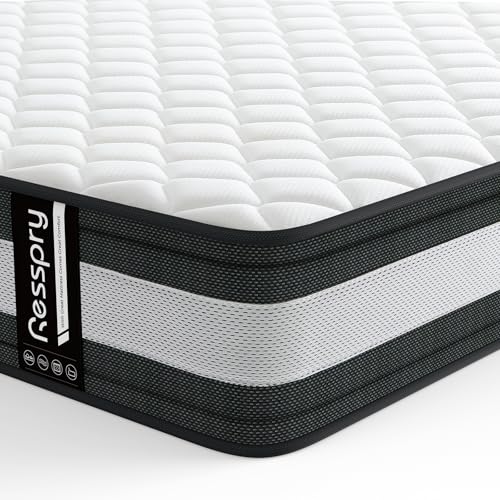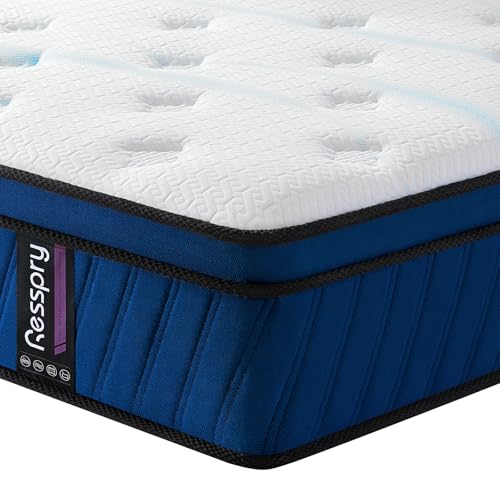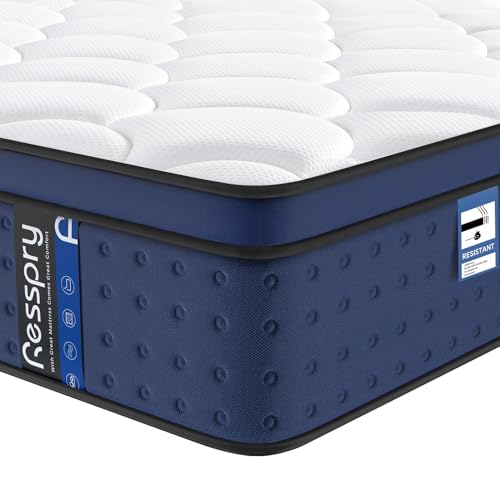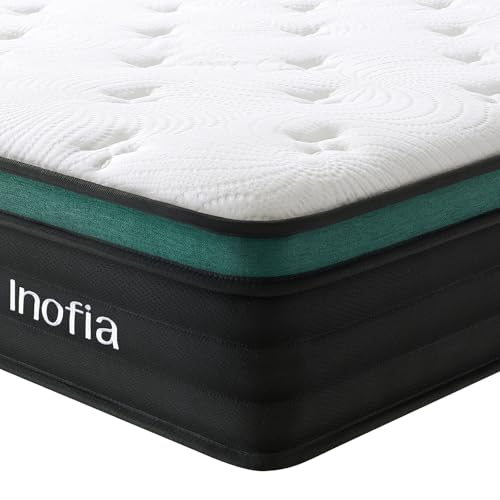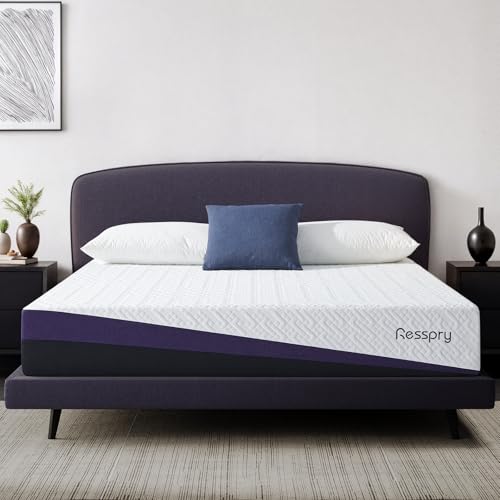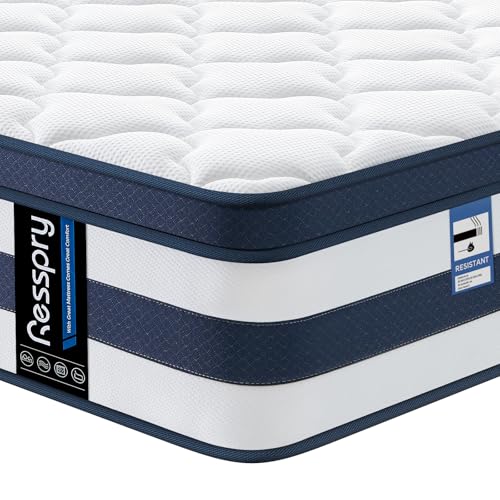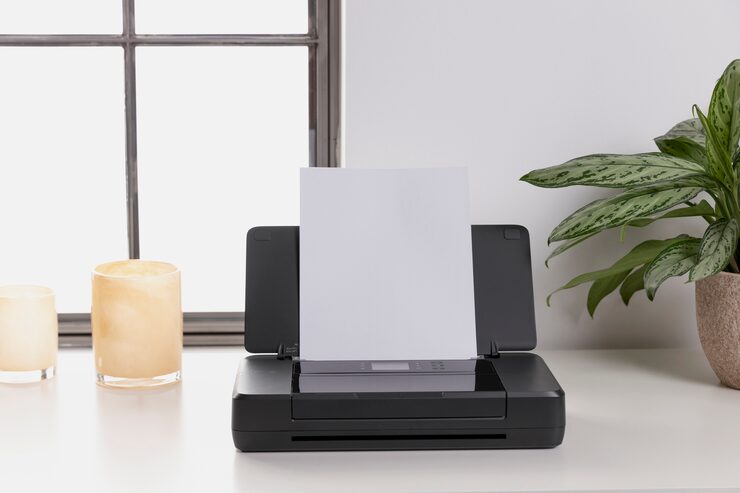A good night’s sleep starts with the right mattress. Memory foam mattresses have become a popular choice for sleepers seeking pressure relief, spinal support, and motion isolation. But not all memory foam mattresses are made the same. Whether you’re a side sleeper, back sleeper, or someone who struggles with chronic pain, choosing the best memory foam mattress for your needs can make all the difference.
This guide breaks down what to consider before buying, compares top-rated options (without naming brands), and helps you decide what’s best for your unique sleep style
Dealmagnet.uk is a participant in the Amazon EU Associates Programme, an affiliate advertising programme designed to provide a means for sites to earn advertising fees by advertising and linking to Amazon.co.uk.
Dealmagnet.uk is a participant in the Amazon EU Associates Programme, an affiliate advertising programme designed to provide a means for sites to earn advertising fees by advertising and linking to Amazon.co.uk.
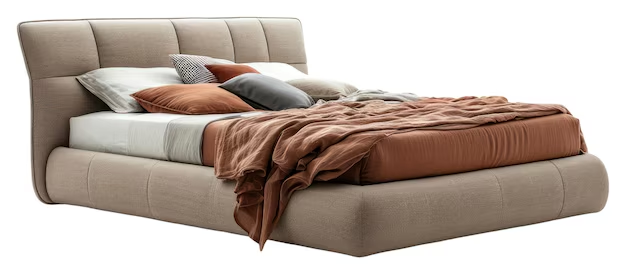
What to Consider Before Buying a Memory Foam Mattress
Before investing in a new mattress, take time to understand how each component affects comfort, durability, and overall support. Below are the key elements you should evaluate carefully.
1. Firmness Level
Firmness plays a major role in sleep comfort and spinal alignment. Memory foam mattresses come in different firmness ratings, typically measured on a scale of 1 to 10.
Soft (3–5 / 10)
This firmness level works well for individuals who prefer a plush, hugging sensation.
Best for:
- Side sleepers
- Individuals with sharp pressure points
- People under 150 lbs
Soft mattresses allow your shoulders and hips to sink slightly, reducing pressure and enhancing comfort.
Medium (5–7 / 10)
Medium firmness is the most popular choice because it suits a wide range of sleepers.
Best for:
- Combination sleepers
- Couples with different preferences
- Back sleepers needing balanced support
This firmness level offers a blend of softness for comfort and firmness for alignment.
Firm (7–9 / 10)
Firm mattresses provide more pushback and support, preventing excessive sinking.
Best for:
- Stomach sleepers
- Back sleepers who need strong lumbar support
- Heavier individuals
A firm surface helps keep the spine aligned and prevents lower-back sagging.
2. Foam Density & Quality
Foam density refers to the mass per cubic foot (lbs/ft³). Higher density generally means better durability and more consistent support.
Low Density (2.5–3.5 lbs/ft³)
- Feels softer
- Breaks in quickly
- More budget-friendly
Suitable for guest rooms or occasional use.
Medium Density (3.5–5 lbs/ft³)
- Balanced support
- Good durability
- Comfortable for most sleepers
Often used in mid-range mattresses.
High Density (5 lbs/ft³ and above)
- Very durable
- Excellent contouring
- Ideal for chronic back or joint discomfort
Look for CertiPUR-US® certification
This ensures the foam is made without harmful chemicals. It indicates peace of mind for those concerned about emissions and safety.
3. Cooling Features
Traditional memory foam tends to trap heat, which can be uncomfortable for hot sleepers. Modern mattresses often include cooling technologies.
Common Cooling Features
- Gel-infused foam: Draws heat away from the body
- Open-cell foam: Allows air to flow freely
- Ventilated foam layers: Added holes enhance breathability
- Graphite-infused foam: Helps dissipate heat more efficiently
If you’re a hot sleeper or live in a warm climate, choosing a mattress with cooling technology is essential.
4. Edge Support
Edge support refers to how well the sides of the mattress hold weight without collapsing.
It matters more than most people realize.
Why Edge Support Matters
- Couples get more usable space
- Sitting on the edge is easier
- Helps prevent rolling off the side
Memory foam sometimes has weaker edge support compared to hybrid or innerspring models. If this is important to you, look for reinforced edges or hybrid designs that combine foam with supportive coils.
5. Motion Isolation
One of the biggest advantages of memory foam is its ability to reduce motion transfer. If you share a bed with a partner, pet, or child, this becomes extremely valuable.
Benefits of Good Motion Isolation
- Less disturbance during the night
- Better sleep quality for light sleepers
- Ideal for couples with different sleep schedules
High-density or multiple-layer foam designs usually offer the best motion isolation.
Product Summary
Here’s a straightforward comparison of three mattress options and their major features. This table helps you quickly understand how different models can vary in firmness, cooling, and overall support.
| Feature | Option A | Option B | Option C |
|---|---|---|---|
| Firmness | Medium-Firm | Soft-Medium | Firm |
| Cooling Technology | Gel-infused | Ventilated foam | Graphite foam |
| Motion Isolation | Excellent | Good | Excellent |
| Edge Support | Moderate | Low | Strong |
| Thickness | 12 inches | 10 inches | 14 inches |
| Trial Period | 100 nights | 90 nights | 120 nights |
Pros & Cons of Memory Foam Mattresses
Understanding the advantages and disadvantages helps set realistic expectations.
✅ Pros
1. Exceptional Pressure Relief
Memory foam molds to your body, offering personalized support and reducing pressure on the shoulders, hips, and lower back.
2. Great Motion Isolation
Perfect for light sleepers, memory foam absorbs movement so you barely feel your partner tossing or turning.
3. Long Lifespan
With proper care, a good-quality memory foam mattress can last 7–10 years or even longer.
4. Wide Range of Firmness Options
Whether you prefer soft or firm, there is always a suitable memory foam option.
❌ Cons
1. Heat Retention
Some memory foam retains heat unless cooling features are added.
2. Slow Response Time
Foam may feel slightly “slow” to adjust when changing positions.
3. Limited Edge Support
Softer memory foam models may compress easily near the edges.
Who It’s Best For
Memory foam mattresses cater to many types of sleepers, but some groups benefit more than others.
1. Side Sleepers
A soft to medium mattress reduces pressure on the shoulders and hips. Look for enhanced contouring.
2. Back Sleepers
Medium to firm options support the natural curvature of the spine and prevent sinking.
3. Hot Sleepers
Breathable or gel-infused foam helps reduce heat buildup during the night.
4. Couples
Motion isolation makes memory foam ideal for shared sleeping arrangements.
5. People with Chronic Discomfort
High-density foam can improve comfort with better weight distribution and support.
Product Examples
Below is a simple product listing overview (no brand names included):
| Product Name | Feature | Price |
|---|---|---|
| 10.6 Inch Hybrid Mattress (King) | King Size Hybrid | View on Amazon |
| King Size Mattress | King Size Comfort | View on Amazon |
| 10.3 Inch Memory Foam Mattress | Memory Foam King Size | View on Amazon |
Frequently Asked Questions (FAQs)
Q: Do memory foam mattresses need a box spring?
A: No. Most memory foam mattresses perform best on solid or slatted foundations.
Q: How long does a memory foam mattress last?
A: Typically 7–10 years, depending on usage and foam density.
Q: Is off-gassing normal?
A: Yes. New foam mattresses may release a temporary odor, which usually fades within 24–48 hours.
Q: Can you flip a memory foam mattress?
A: Most cannot be flipped because they are designed with specific top and bottom layers, but rotating them every few months is recommended.
Q: Is memory foam good for heavier individuals?
A: Yes, especially medium-firm to firm models with high-density foam.
Q: Does memory foam soften over time?
A: Slightly. It adapts to your body and becomes more comfortable as it breaks in.
Final Recommendation
Choosing the best memory foam mattress depends on your body type, sleeping style, firmness preference, temperature needs, and budget. If you value contouring comfort, excellent motion isolation, and pressure relief, memory foam is one of the most reliable options available today.
Before purchasing, always check:
- Mattress firmness
- Foam density
- Cooling features
- Trial period length
- Return or exchange policies
- Certifications (like CertiPUR-US®)
Investing in a good mattress means investing in better sleep—and better sleep improves your productivity, mood, and overall daily life.efore purchasing. Your best night’s sleep could be just one mattress away.
Latest Posts
- Data on Demand: The Ultimate Hard Drive Buying Guide
 UnionSine External Hard Drive 1TB 2.5″ Desktop HDD USB3.0 Storage Compatible for PC, Mac, TV, Desktop, Laptop(Black) HD3513 Aiolo Innovation 500GB Ultra Slim Portable External Hard Drive HDD-USB 3.0 for PC, Mac, Laptop, PS4, Xbox one,Xbox 363-Super Fast Transmission “Dealmagnet.uk is a participant in the Amazon EU Associates Programme, an affiliate advertising programme designed to provide a means for sites to earn advertising fees by advertising and linking to Amazon.co.uk.” In today’s digital age, data storage has become one of the most essential aspects of our daily lives. Whether it’s backing up precious photos, running high-performance software, or… Read more: Data on Demand: The Ultimate Hard Drive Buying Guide
UnionSine External Hard Drive 1TB 2.5″ Desktop HDD USB3.0 Storage Compatible for PC, Mac, TV, Desktop, Laptop(Black) HD3513 Aiolo Innovation 500GB Ultra Slim Portable External Hard Drive HDD-USB 3.0 for PC, Mac, Laptop, PS4, Xbox one,Xbox 363-Super Fast Transmission “Dealmagnet.uk is a participant in the Amazon EU Associates Programme, an affiliate advertising programme designed to provide a means for sites to earn advertising fees by advertising and linking to Amazon.co.uk.” In today’s digital age, data storage has become one of the most essential aspects of our daily lives. Whether it’s backing up precious photos, running high-performance software, or… Read more: Data on Demand: The Ultimate Hard Drive Buying Guide - Power Up Smartly: Ultimate Charger & Battery Buying Guide
 130W USB C Laptop Charger for Dell XPS 15 2in1 9575 9500 9510 9520 9530 17 9700 9710 9720 9730 Precision 5530 2in1 5550 5560 5570 5750 5760 5770 3560 3550 3551 Latitude 7410 9410 5420 5520 Power Cable HP Laptop Charger USB C 65W/45W Type C Power Adapter for HP EliteBook Elite Spectre X360 X2 830 1030 1040 Envy 11 13 14 15 ProBook 430 G6 G7 G8 Chromebook Pavilion,10FT,With UK Power Cable 65W USB-C Laptop Charger for Lenovo ThinkPad X1 T14 T15 T480 T480s T490 T490s T580 X13 X280 X380 E14 E15 E480 E490 Lenovo Yoga… Read more: Power Up Smartly: Ultimate Charger & Battery Buying Guide
130W USB C Laptop Charger for Dell XPS 15 2in1 9575 9500 9510 9520 9530 17 9700 9710 9720 9730 Precision 5530 2in1 5550 5560 5570 5750 5760 5770 3560 3550 3551 Latitude 7410 9410 5420 5520 Power Cable HP Laptop Charger USB C 65W/45W Type C Power Adapter for HP EliteBook Elite Spectre X360 X2 830 1030 1040 Envy 11 13 14 15 ProBook 430 G6 G7 G8 Chromebook Pavilion,10FT,With UK Power Cable 65W USB-C Laptop Charger for Lenovo ThinkPad X1 T14 T15 T480 T480s T490 T490s T580 X13 X280 X380 E14 E15 E480 E490 Lenovo Yoga… Read more: Power Up Smartly: Ultimate Charger & Battery Buying Guide - Perfect Finish Every Time: Ultimate Paint Sprayer Buying Guide
 VOLTSTRIKE Snow Foam Gun 1/4” Quick Connect, Adjustable Snow Foam Lance With 900ml Capacity, Car Sprayer Compatible With Quick Release Pressure Washer Gun – For Car/Window/Outdoor Furniture Cleaning YIREAL Fence Paint Sprayer 800W,Electric Spray Paint Gun with 1300ml Container 3 Meters Cable 1.8M Hose,HVLP Spray Gun with 3 Nozzles 3 Spray Modes for Walls Ceilings Sheds Furniture House Painting “Dealmagnet.uk is a participant in the Amazon EU Associates Programme, an affiliate advertising programme designed to provide a means for sites to earn advertising fees by advertising and linking to Amazon.co.uk.” Painting is one of the most satisfying and… Read more: Perfect Finish Every Time: Ultimate Paint Sprayer Buying Guide
VOLTSTRIKE Snow Foam Gun 1/4” Quick Connect, Adjustable Snow Foam Lance With 900ml Capacity, Car Sprayer Compatible With Quick Release Pressure Washer Gun – For Car/Window/Outdoor Furniture Cleaning YIREAL Fence Paint Sprayer 800W,Electric Spray Paint Gun with 1300ml Container 3 Meters Cable 1.8M Hose,HVLP Spray Gun with 3 Nozzles 3 Spray Modes for Walls Ceilings Sheds Furniture House Painting “Dealmagnet.uk is a participant in the Amazon EU Associates Programme, an affiliate advertising programme designed to provide a means for sites to earn advertising fees by advertising and linking to Amazon.co.uk.” Painting is one of the most satisfying and… Read more: Perfect Finish Every Time: Ultimate Paint Sprayer Buying Guide - Sound Without Strings: Buying Guide for Wireless Earbuds & Earphones
 Niderson Wireless Earbuds, Headphones with Screen Stereo Bass, 48Hrs Playtime, Red Niderson Wireless Earbuds, Headphones with Screen Stereo Bass, 48Hrs Playtime, Grey Niderson Open Ear Wireless Earbuds Bluetooth Headphones, Grey Ear Buds for Fitness/Workouts/Travel “Dealmagnet.uk is a participant in the Amazon EU Associates Programme, an affiliate advertising programme designed to provide a means for sites to earn advertising fees by advertising and linking to Amazon.co.uk.” There was a time when tangled cables, broken jacks, and frayed wires were the everyday frustrations of music lovers. Today, that’s history. Wireless earbuds and earphones have revolutionized how we listen to music,… Read more: Sound Without Strings: Buying Guide for Wireless Earbuds & Earphones
Niderson Wireless Earbuds, Headphones with Screen Stereo Bass, 48Hrs Playtime, Red Niderson Wireless Earbuds, Headphones with Screen Stereo Bass, 48Hrs Playtime, Grey Niderson Open Ear Wireless Earbuds Bluetooth Headphones, Grey Ear Buds for Fitness/Workouts/Travel “Dealmagnet.uk is a participant in the Amazon EU Associates Programme, an affiliate advertising programme designed to provide a means for sites to earn advertising fees by advertising and linking to Amazon.co.uk.” There was a time when tangled cables, broken jacks, and frayed wires were the everyday frustrations of music lovers. Today, that’s history. Wireless earbuds and earphones have revolutionized how we listen to music,… Read more: Sound Without Strings: Buying Guide for Wireless Earbuds & Earphones - Smart Connections:Buying Guide for Adapters & Extensions
 AUNNO Double Shaver Plug Adaptor UK, 2500W 2 Way Plug Adapter for Bathroom Electric Razor and Electric Toothbrush etc, 2 Pin to 3 Pin Plug Adapter with 10A Fuse AUNNO Extension Lead with USB Slots, 4 Way Sockets Outlets with 4 USB-C Ports and 2 USB Ports, 1.8M Extension Cable with Switch Surge Protected Power Strips, UK Multi Plug Adapter Electrical Cords AUNNO Pack of 2 UK to European Plug Adapter, UK 3 Pin to European 2 Pin Plug Converter, Euro Type C, E, F and Type G, EU Plugs for Germany, France, Spain, Greece, Poland etc AUNNO… Read more: Smart Connections:Buying Guide for Adapters & Extensions
AUNNO Double Shaver Plug Adaptor UK, 2500W 2 Way Plug Adapter for Bathroom Electric Razor and Electric Toothbrush etc, 2 Pin to 3 Pin Plug Adapter with 10A Fuse AUNNO Extension Lead with USB Slots, 4 Way Sockets Outlets with 4 USB-C Ports and 2 USB Ports, 1.8M Extension Cable with Switch Surge Protected Power Strips, UK Multi Plug Adapter Electrical Cords AUNNO Pack of 2 UK to European Plug Adapter, UK 3 Pin to European 2 Pin Plug Converter, Euro Type C, E, F and Type G, EU Plugs for Germany, France, Spain, Greece, Poland etc AUNNO… Read more: Smart Connections:Buying Guide for Adapters & Extensions - Clean Smarter: The Ultimate Vacuum Cleaner Buying Guide
 Ultenic T20 Pro Robot Vacuum Cleaner with Mop, 8000Pa Suction, 180 Mins Runtime, Up to 10 Weeks of Hands Free Cleaning, Robot Vacuum with 3.5L Self Emptying Station for Pet Hair, Carpet, Hard Floor “Dealmagnet.uk is a participant in the Amazon EU Associates Programme, an affiliate advertising programme designed to provide a means for sites to earn advertising fees by advertising and linking to Amazon.co.uk.” A clean home isn’t just about appearances — it’s about comfort, hygiene, and health. Dust, allergens, and pet hair accumulate quickly, especially in modern homes with carpets, upholstery, and busy family life. A… Read more: Clean Smarter: The Ultimate Vacuum Cleaner Buying Guide
Ultenic T20 Pro Robot Vacuum Cleaner with Mop, 8000Pa Suction, 180 Mins Runtime, Up to 10 Weeks of Hands Free Cleaning, Robot Vacuum with 3.5L Self Emptying Station for Pet Hair, Carpet, Hard Floor “Dealmagnet.uk is a participant in the Amazon EU Associates Programme, an affiliate advertising programme designed to provide a means for sites to earn advertising fees by advertising and linking to Amazon.co.uk.” A clean home isn’t just about appearances — it’s about comfort, hygiene, and health. Dust, allergens, and pet hair accumulate quickly, especially in modern homes with carpets, upholstery, and busy family life. A… Read more: Clean Smarter: The Ultimate Vacuum Cleaner Buying Guide - Smart Picks: The Ultimate Smartphone Buying Guide
 DOOGEE S200 Max Rugged Smartphone 5G- Android 15 Phones 36GB RAM+512GB ROM Rugged Phone with 22000mAh Battery 6.72″ FHD 120Hz IPS Screen 108MP AI Triple Camera SIM-Free Unlocked Waterproof Phone-Gold “Dealmagnet.uk is a participant in the Amazon EU Associates Programme, an affiliate advertising programme designed to provide a means for sites to earn advertising fees by advertising and linking to Amazon.co.uk.” A smartphone is no longer just a gadget — it’s your personal assistant, entertainment hub, camera, and connection to the world. Whether you’re a student, professional, gamer, or photographer, the right smartphone can simplify your life and… Read more: Smart Picks: The Ultimate Smartphone Buying Guide
DOOGEE S200 Max Rugged Smartphone 5G- Android 15 Phones 36GB RAM+512GB ROM Rugged Phone with 22000mAh Battery 6.72″ FHD 120Hz IPS Screen 108MP AI Triple Camera SIM-Free Unlocked Waterproof Phone-Gold “Dealmagnet.uk is a participant in the Amazon EU Associates Programme, an affiliate advertising programme designed to provide a means for sites to earn advertising fees by advertising and linking to Amazon.co.uk.” A smartphone is no longer just a gadget — it’s your personal assistant, entertainment hub, camera, and connection to the world. Whether you’re a student, professional, gamer, or photographer, the right smartphone can simplify your life and… Read more: Smart Picks: The Ultimate Smartphone Buying Guide - Brew It Right: Your Coffee Buying Guide
 HOSHANHO Steak Knives Set of 6, 4.5 Inch Japanese Serrated Steak Knife Set, Ultra Sharp High Carbon Powder Steel Steak Knife with Pakkawood Handle IKAPE Digital Mini Coffee Scale with Timer, 2kg/0.1g High Precision Rechargeable Drip Espresso Scale with Tare Function, LED Display “Dealmagnet.uk is a participant in the Amazon EU Associates Programme, an affiliate advertising programme designed to provide a means for sites to earn advertising fees by advertising and linking to Amazon.co.uk.” For millions around the world, coffee isn’t just a drink — it’s a ritual, a comfort, and a source of daily inspiration. Whether you… Read more: Brew It Right: Your Coffee Buying Guide
HOSHANHO Steak Knives Set of 6, 4.5 Inch Japanese Serrated Steak Knife Set, Ultra Sharp High Carbon Powder Steel Steak Knife with Pakkawood Handle IKAPE Digital Mini Coffee Scale with Timer, 2kg/0.1g High Precision Rechargeable Drip Espresso Scale with Tare Function, LED Display “Dealmagnet.uk is a participant in the Amazon EU Associates Programme, an affiliate advertising programme designed to provide a means for sites to earn advertising fees by advertising and linking to Amazon.co.uk.” For millions around the world, coffee isn’t just a drink — it’s a ritual, a comfort, and a source of daily inspiration. Whether you… Read more: Brew It Right: Your Coffee Buying Guide - Clean Smarter, Not Harder: The Ultimate Vacuum Cleaner Buying Guide
 Ultenic D10 Robot Vacuum Cleaner with Mop 5000Pa, Precision Lidar Navigation, 5 Maps, 10 No-go Zone, Powerful for All Floor, Carpet & Pet Hair, Siri/Alexa/Google Assistant/APP Remote Control Ultenic U20 Cordless Vacuum Cleaner 55KPa/60Min,Enhanced Powerful Suction, Upgraded Anti Hair Wrap Brush with Fordable Wand, LED Countdown Display, Self Standing Hoover for Floors, Carpet & Pet Hair “Dealmagnet.uk is a participant in the Amazon EU Associates Programme, an affiliate advertising programme designed to provide a means for sites to earn advertising fees by advertising and linking to Amazon.co.uk.” A clean home isn’t just about appearances — it’s about health,… Read more: Clean Smarter, Not Harder: The Ultimate Vacuum Cleaner Buying Guide
Ultenic D10 Robot Vacuum Cleaner with Mop 5000Pa, Precision Lidar Navigation, 5 Maps, 10 No-go Zone, Powerful for All Floor, Carpet & Pet Hair, Siri/Alexa/Google Assistant/APP Remote Control Ultenic U20 Cordless Vacuum Cleaner 55KPa/60Min,Enhanced Powerful Suction, Upgraded Anti Hair Wrap Brush with Fordable Wand, LED Countdown Display, Self Standing Hoover for Floors, Carpet & Pet Hair “Dealmagnet.uk is a participant in the Amazon EU Associates Programme, an affiliate advertising programme designed to provide a means for sites to earn advertising fees by advertising and linking to Amazon.co.uk.” A clean home isn’t just about appearances — it’s about health,… Read more: Clean Smarter, Not Harder: The Ultimate Vacuum Cleaner Buying Guide - Smart Wellness: The Ultimate Buying Guide for Health Products & Gadgets
 Neezee Elliptical Cross Trainer For Home Use, Ultra-Quiet Compact Cross Trainer, 16 Levels of Magnetic Resistance Elliptical Machine, Pulse Sensors, LCD Display, Device Mount, 120KG Capacity DMAUSN ROWING MACHINE “Dealmagnet.uk is a participant in the Amazon EU Associates Programme, an affiliate advertising programme designed to provide a means for sites to earn advertising fees by advertising and linking to Amazon.co.uk.” Health isn’t just about diet and exercise anymore — it’s also about using smart tools that help you track, monitor, and improve your well-being. From fitness trackers and posture correctors to digital thermometers and massage devices, modern health… Read more: Smart Wellness: The Ultimate Buying Guide for Health Products & Gadgets
Neezee Elliptical Cross Trainer For Home Use, Ultra-Quiet Compact Cross Trainer, 16 Levels of Magnetic Resistance Elliptical Machine, Pulse Sensors, LCD Display, Device Mount, 120KG Capacity DMAUSN ROWING MACHINE “Dealmagnet.uk is a participant in the Amazon EU Associates Programme, an affiliate advertising programme designed to provide a means for sites to earn advertising fees by advertising and linking to Amazon.co.uk.” Health isn’t just about diet and exercise anymore — it’s also about using smart tools that help you track, monitor, and improve your well-being. From fitness trackers and posture correctors to digital thermometers and massage devices, modern health… Read more: Smart Wellness: The Ultimate Buying Guide for Health Products & Gadgets - Cozy Comfort: The Ultimate Buying Guide for Blanket Throws
 VANJOROY 100% Organic Cotton Sofa Large Bed Throw Blanket-150x200cm, Bohemian Double-sided Soft Skin-friendly Throw for Single 2 3 Seater Settees Armchair Couch and Bedspread.Teal/Green VANJOROY Bohemian Sofa Throw Blanket with Tassels, 100% Handwoven Cotton Knitted Decorative 90x90cm Small Armchair Throw for Seater Settees Couch and Bed “Dealmagnet.uk is a participant in the Amazon EU Associates Programme, an affiliate advertising programme designed to provide a means for sites to earn advertising fees by advertising and linking to Amazon.co.uk.” Few things feel as comforting as wrapping yourself in a soft blanket throw after a long day. Whether you’re relaxing on… Read more: Cozy Comfort: The Ultimate Buying Guide for Blanket Throws
VANJOROY 100% Organic Cotton Sofa Large Bed Throw Blanket-150x200cm, Bohemian Double-sided Soft Skin-friendly Throw for Single 2 3 Seater Settees Armchair Couch and Bedspread.Teal/Green VANJOROY Bohemian Sofa Throw Blanket with Tassels, 100% Handwoven Cotton Knitted Decorative 90x90cm Small Armchair Throw for Seater Settees Couch and Bed “Dealmagnet.uk is a participant in the Amazon EU Associates Programme, an affiliate advertising programme designed to provide a means for sites to earn advertising fees by advertising and linking to Amazon.co.uk.” Few things feel as comforting as wrapping yourself in a soft blanket throw after a long day. Whether you’re relaxing on… Read more: Cozy Comfort: The Ultimate Buying Guide for Blanket Throws - Smart Shopping Made Simple
 Compressed Air Duster Cleaner for PC, 4 Gear Adjustable 110000RPM Electric Air Duster, Portable Air Dust Blower, Cordless Compressed Air Duster for Computer, Keyboard, Outdoors and Car Cleaning Huquter Expandable Water Bottle Storage, Adjustable Multifunctional Water Bottle Organiser for Cupboard/Countertop/Pantry, 3 Tier Water Bottle Storage Rack for Kitchen Cupboard Tabletop, Office Dbasne Shower Speaker, Portable HD Sound With Suction Cup/Lanyard, IPX7 Waterproof Wireless With RGB Light “Dealmagnet.uk is a participant in the Amazon EU Associates Programme, an affiliate advertising programme designed to provide a means for sites to earn advertising fees by advertising and linking to Amazon.co.uk.” Shopping… Read more: Smart Shopping Made Simple
Compressed Air Duster Cleaner for PC, 4 Gear Adjustable 110000RPM Electric Air Duster, Portable Air Dust Blower, Cordless Compressed Air Duster for Computer, Keyboard, Outdoors and Car Cleaning Huquter Expandable Water Bottle Storage, Adjustable Multifunctional Water Bottle Organiser for Cupboard/Countertop/Pantry, 3 Tier Water Bottle Storage Rack for Kitchen Cupboard Tabletop, Office Dbasne Shower Speaker, Portable HD Sound With Suction Cup/Lanyard, IPX7 Waterproof Wireless With RGB Light “Dealmagnet.uk is a participant in the Amazon EU Associates Programme, an affiliate advertising programme designed to provide a means for sites to earn advertising fees by advertising and linking to Amazon.co.uk.” Shopping… Read more: Smart Shopping Made Simple - Smooth & Secure: Buying Guide for A4 Laminators and ev chargers
 FNITAER EV Charger Cable Type 2 to 3 Pin Plug 2.99kw, 6M, 6/8/10/13A, Adjustable Current EV Charger,With LED Screen Timing Delay IP66/IP65, With Carry Bag and Type 2 EV Cable Holder for EVs and PHEVs A4 Laminator, Laminating Machine with 40 Laminating Pouches, Paper Trimmer, Corner Rounder, Hot and Cold Modus ABS Jam Release Compatible 80-125Micron 280mm/min for Home Office School “Dealmagnet.uk is a participant in the Amazon EU Associates Programme, an affiliate advertising programme designed to provide a means for sites to earn advertising fees by advertising and linking to Amazon.co.uk.” An A4 laminator is a must-have… Read more: Smooth & Secure: Buying Guide for A4 Laminators and ev chargers
FNITAER EV Charger Cable Type 2 to 3 Pin Plug 2.99kw, 6M, 6/8/10/13A, Adjustable Current EV Charger,With LED Screen Timing Delay IP66/IP65, With Carry Bag and Type 2 EV Cable Holder for EVs and PHEVs A4 Laminator, Laminating Machine with 40 Laminating Pouches, Paper Trimmer, Corner Rounder, Hot and Cold Modus ABS Jam Release Compatible 80-125Micron 280mm/min for Home Office School “Dealmagnet.uk is a participant in the Amazon EU Associates Programme, an affiliate advertising programme designed to provide a means for sites to earn advertising fees by advertising and linking to Amazon.co.uk.” An A4 laminator is a must-have… Read more: Smooth & Secure: Buying Guide for A4 Laminators and ev chargers - The Ultimate Smartwatch Buying Guide
 Fitness Tracker for Men Women 24/7 Heart Rate, Step Counter,IP68 Waterproof Activity Tracker with 25 Sport Modes with 1.1″ AMOLED Touch Color Screen with Android and iOS Phones (Deep Sea Blue) QCOQ Smart Watch for Women – Answer/Make Calls & AI Voice, 1.96″ Fitness Watch with Heart Rate SpO2 Sleep Monitor, 100+ Sports Modes Activity Tracker “Dealmagnet.uk is a participant in the Amazon EU Associates Programme, an affiliate advertising programme designed to provide a means for sites to earn advertising fees by advertising and linking to Amazon.co.uk.” Smartwatches are no longer just an accessory for tech lovers –… Read more: The Ultimate Smartwatch Buying Guide
Fitness Tracker for Men Women 24/7 Heart Rate, Step Counter,IP68 Waterproof Activity Tracker with 25 Sport Modes with 1.1″ AMOLED Touch Color Screen with Android and iOS Phones (Deep Sea Blue) QCOQ Smart Watch for Women – Answer/Make Calls & AI Voice, 1.96″ Fitness Watch with Heart Rate SpO2 Sleep Monitor, 100+ Sports Modes Activity Tracker “Dealmagnet.uk is a participant in the Amazon EU Associates Programme, an affiliate advertising programme designed to provide a means for sites to earn advertising fees by advertising and linking to Amazon.co.uk.” Smartwatches are no longer just an accessory for tech lovers –… Read more: The Ultimate Smartwatch Buying Guide - Everyday Comfort Buying Guide: Air Care, Cleaning & Relaxation
 PHI VILLA Folding Side Table, Foldable Coffee Table, Outdoor Garden Table, Small Round Patio Table – Transparent Mitclear 10Ft(3m) Window Cleaning Equipment with Long Handle, Telescopic Window Cleaner Tool with 14” Squeegee & Microfiber Scrubber, Window Washing Kit for High Windows Mirror Shower Glass Car RV Night Vision Goggles, 112MP 4K Night Vision Binoculars with 12x Zoom & 5000mAh Battery, Includes 64GB Card, Infrared Vision, 400m Range, Perfect for Hunting, Camping & Security “Dealmagnet.uk is a participant in the Amazon EU Associates Programme, an affiliate advertising programme designed to provide a means for sites to earn advertising fees… Read more: Everyday Comfort Buying Guide: Air Care, Cleaning & Relaxation
PHI VILLA Folding Side Table, Foldable Coffee Table, Outdoor Garden Table, Small Round Patio Table – Transparent Mitclear 10Ft(3m) Window Cleaning Equipment with Long Handle, Telescopic Window Cleaner Tool with 14” Squeegee & Microfiber Scrubber, Window Washing Kit for High Windows Mirror Shower Glass Car RV Night Vision Goggles, 112MP 4K Night Vision Binoculars with 12x Zoom & 5000mAh Battery, Includes 64GB Card, Infrared Vision, 400m Range, Perfect for Hunting, Camping & Security “Dealmagnet.uk is a participant in the Amazon EU Associates Programme, an affiliate advertising programme designed to provide a means for sites to earn advertising fees… Read more: Everyday Comfort Buying Guide: Air Care, Cleaning & Relaxation - Rugged vs. Flat Smartphones: A Buying Guide
 DOOGEE Note 59 Pro+ 5G Android 15 Smartphone 2025, 36GB+512GB/2TB & T8200 Octa-Core (6nm) Mobile Phones, 120Hz 6.75″ HD+ Display & 6250mAh, 50MP AI Camera, Face + Finger ID/Widevine L1/NFC/GPS/OTG “Dealmagnet.uk is a participant in the Amazon EU Associates Programme, an affiliate advertising programme designed to provide a means for sites to earn advertising fees by advertising and linking to Amazon.co.uk.” Choosing a smartphone today is more than just picking the latest model. For many, it’s about finding a device that fits their lifestyle, work environment, and durability needs. Two popular categories are rugged smartphones and flat (standard… Read more: Rugged vs. Flat Smartphones: A Buying Guide
DOOGEE Note 59 Pro+ 5G Android 15 Smartphone 2025, 36GB+512GB/2TB & T8200 Octa-Core (6nm) Mobile Phones, 120Hz 6.75″ HD+ Display & 6250mAh, 50MP AI Camera, Face + Finger ID/Widevine L1/NFC/GPS/OTG “Dealmagnet.uk is a participant in the Amazon EU Associates Programme, an affiliate advertising programme designed to provide a means for sites to earn advertising fees by advertising and linking to Amazon.co.uk.” Choosing a smartphone today is more than just picking the latest model. For many, it’s about finding a device that fits their lifestyle, work environment, and durability needs. Two popular categories are rugged smartphones and flat (standard… Read more: Rugged vs. Flat Smartphones: A Buying Guide - Everyday Essentials: Mini Sport Camera & Cervical Pillow Guide
 Ehomfory Memory Foam Pillow Neck Pillow Side Sleeper Pillow Cooling Ergonomic Cervical Support for Pain Relief Back Stomach Sleeper (Gray) Digital Camera, FHD 1080P 44MP Kids Camera with 32GB Card, Portable Compact Digital Camera with 16X Digital Zoom, New Models Rechargeable Camera for Kids Teenagers Beginners Adults Boy Girl(Pink) “Dealmagnet.uk is a participant in the Amazon EU Associates Programme, an affiliate advertising programme designed to provide a means for sites to earn advertising fees by advertising and linking to Amazon.co.uk.” When it comes to daily life, two types of products can surprisingly improve comfort and productivity: a mini… Read more: Everyday Essentials: Mini Sport Camera & Cervical Pillow Guide
Ehomfory Memory Foam Pillow Neck Pillow Side Sleeper Pillow Cooling Ergonomic Cervical Support for Pain Relief Back Stomach Sleeper (Gray) Digital Camera, FHD 1080P 44MP Kids Camera with 32GB Card, Portable Compact Digital Camera with 16X Digital Zoom, New Models Rechargeable Camera for Kids Teenagers Beginners Adults Boy Girl(Pink) “Dealmagnet.uk is a participant in the Amazon EU Associates Programme, an affiliate advertising programme designed to provide a means for sites to earn advertising fees by advertising and linking to Amazon.co.uk.” When it comes to daily life, two types of products can surprisingly improve comfort and productivity: a mini… Read more: Everyday Essentials: Mini Sport Camera & Cervical Pillow Guide - Unbeatable Daily Deals – Save Big on Top Picks Across Every Category
 Save Big on Top Picks Across Every Category Clear Waters Made Easy Kapmore Extendable Stainless Steel Pond Leaf Rake with Deep Mesh Net – Ideal for Pool and Pond Cleaning Deep Mesh Net Keep your pond or pool clean with this extendable stainless steel rake featuring a deep mesh net for effortless debris removal. Durable, versatile, and easy to handle for long-lasting use. Pros Cons “This post contains affiliate links. As an Amazon Associate, I earn from qualifying purchases. This means I may earn a small commission if you purchase through my links at no extra cost to… Read more: Unbeatable Daily Deals – Save Big on Top Picks Across Every Category
Save Big on Top Picks Across Every Category Clear Waters Made Easy Kapmore Extendable Stainless Steel Pond Leaf Rake with Deep Mesh Net – Ideal for Pool and Pond Cleaning Deep Mesh Net Keep your pond or pool clean with this extendable stainless steel rake featuring a deep mesh net for effortless debris removal. Durable, versatile, and easy to handle for long-lasting use. Pros Cons “This post contains affiliate links. As an Amazon Associate, I earn from qualifying purchases. This means I may earn a small commission if you purchase through my links at no extra cost to… Read more: Unbeatable Daily Deals – Save Big on Top Picks Across Every Category - Smart Gadget Shopping Guide
 Book Light, Reading Light Book Lamp for Reading at Night,Flexible Reading Lamp with 3 Eye-Protecting Modes, Stepless Dimming, Long Battery Life, 4-Level Power Indicator, USB Rechargeable Book Light Rechargeable book light with flexible neck, stepless dimming, 3 lighting modes, and long-lasting battery for night reading comfort. Pros Cons “This post contains affiliate links. As an Amazon Associate, I earn from qualifying purchases. This means I may earn a small commission if you purchase through my links at no extra cost to you.” In today’s digital age, gadgets have become an essential part of our everyday life. From fitness… Read more: Smart Gadget Shopping Guide
Book Light, Reading Light Book Lamp for Reading at Night,Flexible Reading Lamp with 3 Eye-Protecting Modes, Stepless Dimming, Long Battery Life, 4-Level Power Indicator, USB Rechargeable Book Light Rechargeable book light with flexible neck, stepless dimming, 3 lighting modes, and long-lasting battery for night reading comfort. Pros Cons “This post contains affiliate links. As an Amazon Associate, I earn from qualifying purchases. This means I may earn a small commission if you purchase through my links at no extra cost to you.” In today’s digital age, gadgets have become an essential part of our everyday life. From fitness… Read more: Smart Gadget Shopping Guide
Dealmagnet.uk is a participant in the Amazon EU Associates Programme, an affiliate advertising programme designed to provide a means for sites to earn advertising fees by advertising and linking to Amazon.co.uk



